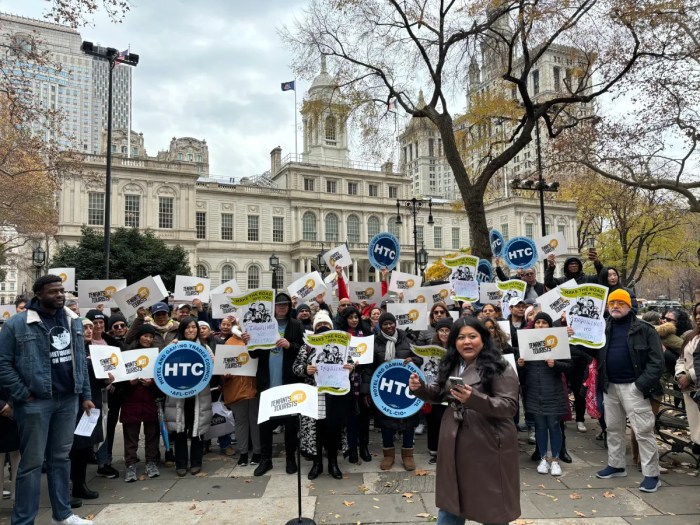By Bill Parry
A 9/11 first responder from Middle Village and a survivor from Flushing, both suffering the effects of cancer, went back to Ground Zero to call on Congress to reauthorize the Zadroga Act, and make it permanent. The law, which provides health care and compensation to those with 9/11-related illnesses, is slated to expire next year.
“These men and women are the heroes of 9/11 and they shouldn’t have to come to Congress to beg for their lives,” U.S. Rep. Carolyn Maloney (D-Astoria) said. “They’ve endured chemotherapy, daily asthma attacks, permanent disabilities, post-traumatic stress and other terrible illnesses. They live with the consequences daily.”
Former NYPD Det. Joseph Ramondino, 53, of Middle Village has battled two cancers since retiring in 2004 and endured multiple surgeries and treatments.
“It’s not about me because I’m not terminal like some of these other folks,” he said. “The program worked for me. I’m OK, but many are not and those are the people that this is about, the ones who are sick now and will be sick in the coming years. Extending the Zadroga Act and making it permanent is the right thing to do regardless of politics.”
Flushing resident Patricia Workman, 77, went to work as a volunteer for the Red Cross, the Salvation Army and Port Authority caring for the workers who came off the pile week after week. “When I first got down there, there was this white powder on every building, on every floor. When the workers came off the pile, they were covered in that dust day after day,” she said. “Nobody wore masks because the feds said the air was safe.”
But it wasn’t. More than 33,000 9/11 responders as well as survivors of the attacks, including area residents, workers and children, have illnesses caused by breathing in the toxic dust, and over two-thirds of those have more than one illness.
So far, 4,385 cancers have been found among 9/11 responders and survivors, according to data from the Centers for Disease Control. Workman was at Ground Zero four days a week for more than a year and a half.
“In 2007 my bones began to break and no one could figure out why,” she said. “When they told me I had multiple myeloma, it was like I was hit by a Mack truck. The program got me a stem cell replacement and it changed everything. I was cancer free for five years before my relapse. If the program ends, I’ll be all right, but a lot of others would surely die without the medications and treatments.”
Without congressional action, the World Trade Center Health Program and the Victim Compensation Fund will expire next year, leaving more than 70,000 9/11 responders and survivors in all 50 states without the care and support they need to recover from 9/11-related illnesses.
Several of the afflicted survivors spoke during the rally, including the current mayor of Spotswood, N.J., Nicolas Poliseno. He was a responder for Con Ed who worked to restore power in Lower Manhattan after the towers collapsed.
The married father of two children is now terminally ill with an auto-immune disease, relying on 23 medications daily. For the last four years, Poliseno has been hospitalized every 14 days for a procedure called IVIG, each treatment costing $1,000.
Susan Herr was a computer programmer for Morgan Stanley on the 68th floor of the South Tower. Today she suffers from the WTC Cough, asthma, cancer, PTSD and some depression. She has problems sleeping, difficulty walking and breathing, and can no longer live alone.
“I thought the hardest day of my life was 9/11,” Herr said. “I was wrong. Having chemotherapy and radiation at the same time is much harder.”
The Zadroga Act was named for James Zadroga, the first NYPD officer whose death from respiratory disease was attributed to exposure to the toxic dust in the rubble of the World Trade Center. His father Joe told the crowd that he would go to Washington and confront any lawmaker who stood in the way of the act’s permanent extension.
“I don’t want to speak to any representatives in your office,” Zadroga said. “I want to speak to you personally and let you know what it’s like to watch your son die over a five-year period with no support. And that’s what’s going to happen if this bill is not passed.”
Neither Ramondino nor Workman regret their roles at Ground Zero 14 years ago.
“We couldn’t wait to get down there and do our duty,” Ramondino said. “Everyone wanted to be down there.”
Workman remembers seeing workers and volunteers from every state and more.
“People came from all over the world to help us down there,” she said. “How can we deny anyone of them the health care they need?”
Reach reporter Bill Parry by e-mail at bparr




































